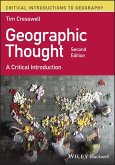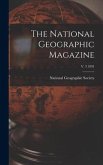George Henderson / Marvin Waterstone (eds.)A Praxis Perspective
Geographic Thought
A Praxis Perspective
Herausgeber: Henderson, George; Waterstone, Marvin
George Henderson / Marvin Waterstone (eds.)A Praxis Perspective
Geographic Thought
A Praxis Perspective
Herausgeber: Henderson, George; Waterstone, Marvin
- Gebundenes Buch
- Merkliste
- Auf die Merkliste
- Bewerten Bewerten
- Teilen
- Produkt teilen
- Produkterinnerung
- Produkterinnerung
Offers an approach to learning about 'Geographic Thought'. This book provides readers with insights into the encounters between scholarship and practice and aims to prompt debates over how social and geographical knowledges arise from the context of social struggles. It is intended for researchers and students.
This unabridged reader offers a fresh approach to learning about Geographic Thought by showing, through concrete examples and detailed editorial essays, how the discipline has been forever altered by the rise of progressive social struggles of the last 30 years.
Andere Kunden interessierten sich auch für
![Geographic Thought Geographic Thought]() Tim CresswellGeographic Thought25,99 €
Tim CresswellGeographic Thought25,99 €![Themes in Geographic Thought (Routledge Revivals) Themes in Geographic Thought (Routledge Revivals)]() Themes in Geographic Thought (Routledge Revivals)137,99 €
Themes in Geographic Thought (Routledge Revivals)137,99 €![Western Geopolitical Thought in the Twentieth Century (Routledge Library Editions: Political Geography) Western Geopolitical Thought in the Twentieth Century (Routledge Library Editions: Political Geography)]() Geoffrey ParkerWestern Geopolitical Thought in the Twentieth Century (Routledge Library Editions: Political Geography)180,99 €
Geoffrey ParkerWestern Geopolitical Thought in the Twentieth Century (Routledge Library Editions: Political Geography)180,99 €![Geographic Information Systems Geographic Information Systems]() David MartinGeographic Information Systems246,99 €
David MartinGeographic Information Systems246,99 €![A Student′s Introduction to Geographical Thought A Student′s Introduction to Geographical Thought]() Pauline CouperA Student′s Introduction to Geographical Thought165,99 €
Pauline CouperA Student′s Introduction to Geographical Thought165,99 €![National geographic Magazine Index July to December 1920 (Volume XXXVIII) National geographic Magazine Index July to December 1920 (Volume XXXVIII)]() UnknownNational geographic Magazine Index July to December 1920 (Volume XXXVIII)57,99 €
UnknownNational geographic Magazine Index July to December 1920 (Volume XXXVIII)57,99 €![The National Geographic Magazine; v. 3 1891 The National Geographic Magazine; v. 3 1891]() The National Geographic Magazine; v. 3 189138,99 €
The National Geographic Magazine; v. 3 189138,99 €-
-
-
Offers an approach to learning about 'Geographic Thought'. This book provides readers with insights into the encounters between scholarship and practice and aims to prompt debates over how social and geographical knowledges arise from the context of social struggles. It is intended for researchers and students.
This unabridged reader offers a fresh approach to learning about Geographic Thought by showing, through concrete examples and detailed editorial essays, how the discipline has been forever altered by the rise of progressive social struggles of the last 30 years.
Hinweis: Dieser Artikel kann nur an eine deutsche Lieferadresse ausgeliefert werden.
This unabridged reader offers a fresh approach to learning about Geographic Thought by showing, through concrete examples and detailed editorial essays, how the discipline has been forever altered by the rise of progressive social struggles of the last 30 years.
Hinweis: Dieser Artikel kann nur an eine deutsche Lieferadresse ausgeliefert werden.
Produktdetails
- Produktdetails
- Verlag: Routledge
- Seitenzahl: 396
- Erscheinungstermin: 11. September 2008
- Englisch
- Abmessung: 260mm x 208mm x 26mm
- Gewicht: 1069g
- ISBN-13: 9780415471695
- ISBN-10: 0415471699
- Artikelnr.: 25683391
- Herstellerkennzeichnung
- Libri GmbH
- Europaallee 1
- 36244 Bad Hersfeld
- gpsr@libri.de
- Verlag: Routledge
- Seitenzahl: 396
- Erscheinungstermin: 11. September 2008
- Englisch
- Abmessung: 260mm x 208mm x 26mm
- Gewicht: 1069g
- ISBN-13: 9780415471695
- ISBN-10: 0415471699
- Artikelnr.: 25683391
- Herstellerkennzeichnung
- Libri GmbH
- Europaallee 1
- 36244 Bad Hersfeld
- gpsr@libri.de
George Henderson is a human geographer who teaches and writes about the political economy of American capitalism. He is the author of the book California and the Fictions of Capital (Temple University Press paperback, 2003) and is Associate Professor of Geography at the University of Minnesota. Marv Waterstone is Associate Professor of Geography at the University of Arizona. He was also the Director of the University of Arizona's Interdisciplinary Graduate Program in Comparative Cultural and Literary Studies. His current teaching includes History of Geographic Thought, Risk and Society, Radical Geography, Geography and Social Justice, Environmental and Resource Geography, and Governing Science and Technology.
Section 1: The Politics of Geographic Thought Introduction: Why is
Geographic Thought Always Political? 1. Revolutionary and
Counter-revolutionary Theory in Geography and the Problem of Ghetto
Formation (DAVID HARVEY) 2. Geographic Models of Imperialism (JAMES BLAUT)
3. On Not Excluding Half of the Human in Human Geography (JANICE MONK and
SUSAN HANSON) Section 2: Staking Claims Introduction: Moral Knowledge,
Geographical Knowledge: What Does it Mean to Claim Moral Ground, or How is
Oppression to be Recognized? Part One: Characterizing Oppressions and
Recognizing Injustice Introduction 4. Five Faces of Oppression (IRIS MARION
YOUNG) 5. Social Justice in the Age of Identity Politics: Redistribution,
Recognition, and Participation (NANCY FRASER) Part Two: Making Justice
Spatial Introduction 6. Moral Progress in Human Geography: Transcending the
Place of Good Fortune (DAVID SMITH) 7. Dissecting the Autonomous Self:
Hybrid Cartographies For A Relational Ethics (SARAH WHATMORE) Part Three:
Practicing Politicized Geographic Thought Introduction 8. Maps, Knowledge,
and Power (J. BRIAN HARLEY) 9. Collaboration Across Borders: Moving Beyond
Positionality (RICHA NAGAR, with FARAH ALI) 10. Research, Pedagogy, and
Instrumental Geography (RICH HEYMAN) 11. Situated Knowledge Through
Exploration: Reflections on Bunge's 'Geographic Expeditions' (ANDY
MERRIFIELD) Section 3: Goals and Arenas of Struggle: What is to be gained
and How? Introduction: The Embeddedness of Intentions, Tactics, and
Strategies in Rights-, Justice-, and Ethics-based Worldviews Part One:
Rights-based Goals Introduction 12. Mobility, Empowerment and the Rights
Revolution (NICHOLAS BLOMLEY) 13. Human Rights and Development in Africa:
Moral Intrusion or Empowering Opportunity? (GILES MOHAN and JEREMY HOLLAND)
14. New World Warriors: 'nation' and 'state' in the Politics of Zapatista
and US Patriot Movements (CAROLYN GALLAHER and OLIVER FROEHLING) 15. Social
Theory and the De/reconstruction of Agricultural Science: Local Knowledge
for an Alternative Agriculture (JACK KLOPPENBERG, JR.) Part Two:
Justice-based Goals Introduction 16. Restructuring the Contraction and
Expansion of Environmental Rights in the United States (LAURA PULIDO) 17.
Environmental Justice and American Indian Tribal Sovereignty: Case Study of
a Land-use Conflict in Skull Valley, Utah (NORIKO ISHIYAMA) 18. Structural
Power, Agency, and National Liberation: The Case of East Timor (JAMES
GLASSMAN) Part Three: Ethics-based Goals Introduction 19. Post-Marxism:
Democracy and Identity (CHANTAL MOUFFE) 20. U.S. Third World Feminism: The
Theory and Method of the Oppositional Consciousness in the Postmodern World
(CHELA SANDOVAL) 21. An Ethics of the Local (J. K. GIBSON-GRAHAM)
Geographic Thought Always Political? 1. Revolutionary and
Counter-revolutionary Theory in Geography and the Problem of Ghetto
Formation (DAVID HARVEY) 2. Geographic Models of Imperialism (JAMES BLAUT)
3. On Not Excluding Half of the Human in Human Geography (JANICE MONK and
SUSAN HANSON) Section 2: Staking Claims Introduction: Moral Knowledge,
Geographical Knowledge: What Does it Mean to Claim Moral Ground, or How is
Oppression to be Recognized? Part One: Characterizing Oppressions and
Recognizing Injustice Introduction 4. Five Faces of Oppression (IRIS MARION
YOUNG) 5. Social Justice in the Age of Identity Politics: Redistribution,
Recognition, and Participation (NANCY FRASER) Part Two: Making Justice
Spatial Introduction 6. Moral Progress in Human Geography: Transcending the
Place of Good Fortune (DAVID SMITH) 7. Dissecting the Autonomous Self:
Hybrid Cartographies For A Relational Ethics (SARAH WHATMORE) Part Three:
Practicing Politicized Geographic Thought Introduction 8. Maps, Knowledge,
and Power (J. BRIAN HARLEY) 9. Collaboration Across Borders: Moving Beyond
Positionality (RICHA NAGAR, with FARAH ALI) 10. Research, Pedagogy, and
Instrumental Geography (RICH HEYMAN) 11. Situated Knowledge Through
Exploration: Reflections on Bunge's 'Geographic Expeditions' (ANDY
MERRIFIELD) Section 3: Goals and Arenas of Struggle: What is to be gained
and How? Introduction: The Embeddedness of Intentions, Tactics, and
Strategies in Rights-, Justice-, and Ethics-based Worldviews Part One:
Rights-based Goals Introduction 12. Mobility, Empowerment and the Rights
Revolution (NICHOLAS BLOMLEY) 13. Human Rights and Development in Africa:
Moral Intrusion or Empowering Opportunity? (GILES MOHAN and JEREMY HOLLAND)
14. New World Warriors: 'nation' and 'state' in the Politics of Zapatista
and US Patriot Movements (CAROLYN GALLAHER and OLIVER FROEHLING) 15. Social
Theory and the De/reconstruction of Agricultural Science: Local Knowledge
for an Alternative Agriculture (JACK KLOPPENBERG, JR.) Part Two:
Justice-based Goals Introduction 16. Restructuring the Contraction and
Expansion of Environmental Rights in the United States (LAURA PULIDO) 17.
Environmental Justice and American Indian Tribal Sovereignty: Case Study of
a Land-use Conflict in Skull Valley, Utah (NORIKO ISHIYAMA) 18. Structural
Power, Agency, and National Liberation: The Case of East Timor (JAMES
GLASSMAN) Part Three: Ethics-based Goals Introduction 19. Post-Marxism:
Democracy and Identity (CHANTAL MOUFFE) 20. U.S. Third World Feminism: The
Theory and Method of the Oppositional Consciousness in the Postmodern World
(CHELA SANDOVAL) 21. An Ethics of the Local (J. K. GIBSON-GRAHAM)
Section 1: The Politics of Geographic Thought Introduction: Why is
Geographic Thought Always Political? 1. Revolutionary and
Counter-revolutionary Theory in Geography and the Problem of Ghetto
Formation (DAVID HARVEY) 2. Geographic Models of Imperialism (JAMES BLAUT)
3. On Not Excluding Half of the Human in Human Geography (JANICE MONK and
SUSAN HANSON) Section 2: Staking Claims Introduction: Moral Knowledge,
Geographical Knowledge: What Does it Mean to Claim Moral Ground, or How is
Oppression to be Recognized? Part One: Characterizing Oppressions and
Recognizing Injustice Introduction 4. Five Faces of Oppression (IRIS MARION
YOUNG) 5. Social Justice in the Age of Identity Politics: Redistribution,
Recognition, and Participation (NANCY FRASER) Part Two: Making Justice
Spatial Introduction 6. Moral Progress in Human Geography: Transcending the
Place of Good Fortune (DAVID SMITH) 7. Dissecting the Autonomous Self:
Hybrid Cartographies For A Relational Ethics (SARAH WHATMORE) Part Three:
Practicing Politicized Geographic Thought Introduction 8. Maps, Knowledge,
and Power (J. BRIAN HARLEY) 9. Collaboration Across Borders: Moving Beyond
Positionality (RICHA NAGAR, with FARAH ALI) 10. Research, Pedagogy, and
Instrumental Geography (RICH HEYMAN) 11. Situated Knowledge Through
Exploration: Reflections on Bunge's 'Geographic Expeditions' (ANDY
MERRIFIELD) Section 3: Goals and Arenas of Struggle: What is to be gained
and How? Introduction: The Embeddedness of Intentions, Tactics, and
Strategies in Rights-, Justice-, and Ethics-based Worldviews Part One:
Rights-based Goals Introduction 12. Mobility, Empowerment and the Rights
Revolution (NICHOLAS BLOMLEY) 13. Human Rights and Development in Africa:
Moral Intrusion or Empowering Opportunity? (GILES MOHAN and JEREMY HOLLAND)
14. New World Warriors: 'nation' and 'state' in the Politics of Zapatista
and US Patriot Movements (CAROLYN GALLAHER and OLIVER FROEHLING) 15. Social
Theory and the De/reconstruction of Agricultural Science: Local Knowledge
for an Alternative Agriculture (JACK KLOPPENBERG, JR.) Part Two:
Justice-based Goals Introduction 16. Restructuring the Contraction and
Expansion of Environmental Rights in the United States (LAURA PULIDO) 17.
Environmental Justice and American Indian Tribal Sovereignty: Case Study of
a Land-use Conflict in Skull Valley, Utah (NORIKO ISHIYAMA) 18. Structural
Power, Agency, and National Liberation: The Case of East Timor (JAMES
GLASSMAN) Part Three: Ethics-based Goals Introduction 19. Post-Marxism:
Democracy and Identity (CHANTAL MOUFFE) 20. U.S. Third World Feminism: The
Theory and Method of the Oppositional Consciousness in the Postmodern World
(CHELA SANDOVAL) 21. An Ethics of the Local (J. K. GIBSON-GRAHAM)
Geographic Thought Always Political? 1. Revolutionary and
Counter-revolutionary Theory in Geography and the Problem of Ghetto
Formation (DAVID HARVEY) 2. Geographic Models of Imperialism (JAMES BLAUT)
3. On Not Excluding Half of the Human in Human Geography (JANICE MONK and
SUSAN HANSON) Section 2: Staking Claims Introduction: Moral Knowledge,
Geographical Knowledge: What Does it Mean to Claim Moral Ground, or How is
Oppression to be Recognized? Part One: Characterizing Oppressions and
Recognizing Injustice Introduction 4. Five Faces of Oppression (IRIS MARION
YOUNG) 5. Social Justice in the Age of Identity Politics: Redistribution,
Recognition, and Participation (NANCY FRASER) Part Two: Making Justice
Spatial Introduction 6. Moral Progress in Human Geography: Transcending the
Place of Good Fortune (DAVID SMITH) 7. Dissecting the Autonomous Self:
Hybrid Cartographies For A Relational Ethics (SARAH WHATMORE) Part Three:
Practicing Politicized Geographic Thought Introduction 8. Maps, Knowledge,
and Power (J. BRIAN HARLEY) 9. Collaboration Across Borders: Moving Beyond
Positionality (RICHA NAGAR, with FARAH ALI) 10. Research, Pedagogy, and
Instrumental Geography (RICH HEYMAN) 11. Situated Knowledge Through
Exploration: Reflections on Bunge's 'Geographic Expeditions' (ANDY
MERRIFIELD) Section 3: Goals and Arenas of Struggle: What is to be gained
and How? Introduction: The Embeddedness of Intentions, Tactics, and
Strategies in Rights-, Justice-, and Ethics-based Worldviews Part One:
Rights-based Goals Introduction 12. Mobility, Empowerment and the Rights
Revolution (NICHOLAS BLOMLEY) 13. Human Rights and Development in Africa:
Moral Intrusion or Empowering Opportunity? (GILES MOHAN and JEREMY HOLLAND)
14. New World Warriors: 'nation' and 'state' in the Politics of Zapatista
and US Patriot Movements (CAROLYN GALLAHER and OLIVER FROEHLING) 15. Social
Theory and the De/reconstruction of Agricultural Science: Local Knowledge
for an Alternative Agriculture (JACK KLOPPENBERG, JR.) Part Two:
Justice-based Goals Introduction 16. Restructuring the Contraction and
Expansion of Environmental Rights in the United States (LAURA PULIDO) 17.
Environmental Justice and American Indian Tribal Sovereignty: Case Study of
a Land-use Conflict in Skull Valley, Utah (NORIKO ISHIYAMA) 18. Structural
Power, Agency, and National Liberation: The Case of East Timor (JAMES
GLASSMAN) Part Three: Ethics-based Goals Introduction 19. Post-Marxism:
Democracy and Identity (CHANTAL MOUFFE) 20. U.S. Third World Feminism: The
Theory and Method of the Oppositional Consciousness in the Postmodern World
(CHELA SANDOVAL) 21. An Ethics of the Local (J. K. GIBSON-GRAHAM)








